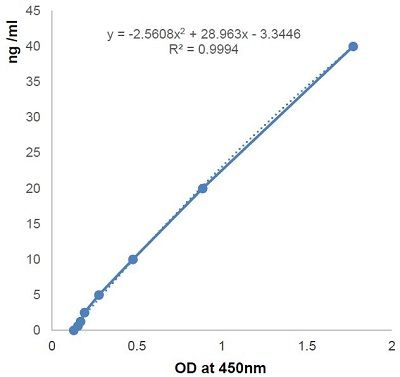Isthmin-1 (human) ELISA Kit
Product Code:
AG-45B-0032
AG-45B-0032
Host Type:
Human
Human
Regulatory Status:
RUO
RUO
Shipping:
BI
BI
Storage:
Short term: +4°C. Long term: +4°C
Short term: +4°C. Long term: +4°C
No additional charges, what you see is what you pay! *
| Code | Size | Price |
|---|
| AG-45B-0032-KI01 | 96 wells | £470.00 |
Quantity:
Prices exclude any Taxes / VAT
Stay in control of your spending. These prices have no additional charges, not even shipping!
* Rare exceptions are clearly labelled (only 0.14% of items!).
* Rare exceptions are clearly labelled (only 0.14% of items!).
Multibuy discounts available! Contact us to find what you can save.
This product comes from: Switzerland.
Typical lead time: 7-10 working days.
Contact us for more accurate information.
Typical lead time: 7-10 working days.
Contact us for more accurate information.
- Further Information
- Documents
- Show All
Further Information
Alternate Names/Synonyms:
C20orf82; ISM1; ISM
Assay Type:
Sandwich
Detection Type:
Colorimetric
Handling Advice:
After standard reconstitution, prepare aliquots and store at -20°C. Avoid freeze/thaw cycles. Plate and reagents should reach room temperature before use.
Long Description:
Isthmin-1 (ISM1) was first identified as a gene expressed in the Xenopus midbrain-hindbrain organizer called the isthmus, with a proposed role during early brain development. Isthmin-1 encodes a predicted ~50kDa protein containing a signal peptide, a thrombospondin domain and an adhesion-associated domain. Isthmin-1 is important for embryonic and postnatal development. Growing evidence has shown that aberrant expression of Isthmin-1 can also affect the biological behavior of cancer. The Ism1 gene is conserved in mice and humans. A recent study showed that Isthmin-1 is an adipokine that induces glucose uptake in human and mouse adipocytes. Mature adipocytes secrete isthmin-1 and trigger a signaling cascade similar to that of insulin, regulating glucose uptake while suppressing lipid accumulation. Recombinant Isthmin-1 or overexpression of Isthmin-1 causes a robust increase in GLUT4-dependent glucose uptake in cultured primary murine and immortalized human adipocytes as well as in primary human muscle cells and prevents insulin resistance and hepatic steatosis in a diet-induced obesity mouse model. Ablation of Isthmin-1 causes glucose intolerance and impaired insulin-stimulated adipocyte glucose uptake. Isthmin-1 suppresses de novo lipogenesis and increases protein synthesis in hepatocytes whereas Isthmin-1 knockdown in adipocytes reduces glucose uptake and insulin-dependent phosphorylation of protein kinase AKT at serine residue 473 (p-AKTSer473). Isthmin-1 signaling is dependent on PI3K and shares downstream phosphorylation targets with insulin signaling, such as p-AKTSer473, p-AKTThr308, p-ERK1/2Thr202/Tyr204 and p-S6Ser235/236. Isthmin-1 does not seem to act through the insulin receptor or the insulin-like growth factor 1 receptor; it is most likely to signal through another, yet-to-be-identified, receptor tyrosine kinase. Isthmin-1 levels positively correlate with obesity in human plasma and are also associated with T cell depletion markers (PD-1, LAG-3, TIM-3 or CTLA-4), suggesting its use as a biomarker during immunotherapy.
Other Data:
Quantitative ELISA
Range:
0.625 to 40ng/ml
Sample Type:
Cell Culture Supernatant; Plasma
Sensitivity:
0.4 ng/ml
Species Crossreactivity:
Human; Mouse
Specificity:
Detects human Isthmin-1 in plasma and cell culture supernatant. It detects also mouse Isthmin-1 (very conserved).
Use & Stability:
12 months after the day of manufacturing. See expiry date on ELISA Kit box.



